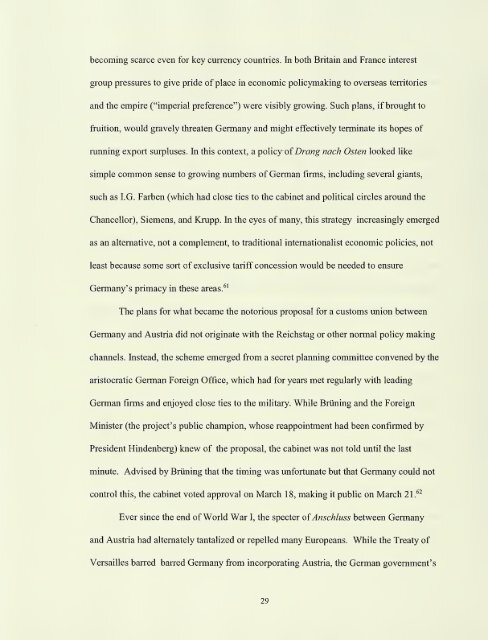Made in Germany : the German currency crisis of July 1931
Made in Germany : the German currency crisis of July 1931
Made in Germany : the German currency crisis of July 1931
Create successful ePaper yourself
Turn your PDF publications into a flip-book with our unique Google optimized e-Paper software.
ecom<strong>in</strong>g scarce even for key <strong>currency</strong> countries. In both Brita<strong>in</strong> and France <strong>in</strong>terest<br />
group pressures to give pride <strong>of</strong> place <strong>in</strong> economic policymak<strong>in</strong>g to overseas territories<br />
and <strong>the</strong> empire ("imperial preference") were visibly grow<strong>in</strong>g. Such plans, if brought to<br />
fruition, would gravely threaten <strong><strong>German</strong>y</strong> and might effectively term<strong>in</strong>ate its hopes <strong>of</strong><br />
runn<strong>in</strong>g export surpluses. In this context, a policy <strong>of</strong> Drang nach Osten looked like<br />
simple common sense to grow<strong>in</strong>g numbers <strong>of</strong> <strong>German</strong> firms, <strong>in</strong>clud<strong>in</strong>g several giants,<br />
such as I.G. Farben (which had close ties to <strong>the</strong> cab<strong>in</strong>et and political circles around <strong>the</strong><br />
Chancellor), Siemens, and Krupp. In <strong>the</strong> eyes <strong>of</strong> many, this strategy <strong>in</strong>creas<strong>in</strong>gly emerged<br />
as an alternative, not a complement, to traditional <strong>in</strong>ternationalist economic policies, not<br />
least because some sort <strong>of</strong> exclusive tariff concession would be needed to ensure<br />
<strong><strong>German</strong>y</strong>'s primacy <strong>in</strong> <strong>the</strong>se areas. 61<br />
The plans for what became <strong>the</strong> notorious proposal for a customs union between<br />
<strong><strong>German</strong>y</strong> and Austria did not orig<strong>in</strong>ate with <strong>the</strong> Reichstag or o<strong>the</strong>r normal policy mak<strong>in</strong>g<br />
channels. Instead, <strong>the</strong> scheme emerged from a secret plann<strong>in</strong>g committee convened by <strong>the</strong><br />
aristocratic <strong>German</strong> Foreign Office, which had for years met regularly with lead<strong>in</strong>g<br />
<strong>German</strong> firms and enjoyed close ties to <strong>the</strong> military. While Bri<strong>in</strong><strong>in</strong>g and <strong>the</strong> Foreign<br />
M<strong>in</strong>ister (<strong>the</strong> project's public champion, whose reappo<strong>in</strong>tment had been confirmed by<br />
President H<strong>in</strong>denberg) knew <strong>of</strong> <strong>the</strong> proposal, <strong>the</strong> cab<strong>in</strong>et was not told until <strong>the</strong> last<br />
m<strong>in</strong>ute. Advised by Bri<strong>in</strong><strong>in</strong>g that <strong>the</strong> tim<strong>in</strong>g was unfortunate but that <strong><strong>German</strong>y</strong> could not<br />
control this, <strong>the</strong> cab<strong>in</strong>et voted approval on March 18, mak<strong>in</strong>g it public on March 21. 62<br />
Ever s<strong>in</strong>ce <strong>the</strong> end <strong>of</strong> World War I, <strong>the</strong> specter <strong>of</strong> Anschluss between <strong><strong>German</strong>y</strong><br />
and Austria had alternately tantalized or repelled many Europeans. While <strong>the</strong> Treaty <strong>of</strong><br />
Versailles barred barred <strong><strong>German</strong>y</strong> from <strong>in</strong>corporat<strong>in</strong>g Austria, <strong>the</strong> <strong>German</strong> government's<br />
29



